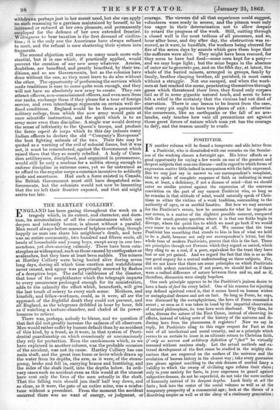THE ILARTLEY COLLIERY. E NGLAND has been gazing throughout the week
on a tragedy which, in its extent, and character, and dura- tion, its accumulation of all the circumstances which can deepen and intensify horror, is almost without a parallel. Men recoil always before masses of helpless suffering, though happily no man can share his neighbour's death, and here was an entire community, two hundred and fifteen souls, all heads of households and young boys, swept away in one tre- mendous, yet slow-moving calamity. There have been cata- strophes as widespread, such as those caused by earthquakes or avalanches, but they have at least been sudden. The miners at Hartley Colliery were being buried alive during seven long days, during all which time exertion and watchfulness never ceased, and agony was perpetually renewed by flashes of a deceptive hope. The awful visibleness of the disaster, that tone of the amphitheatre which the telegraph imparts to every occurrence prolonged enough for its ministration, adds to the calamity the effect which, henceforth, will give the last touch of misery to every such scene. Mothers, and kinsfolk, and fellow-workmen, could, as it were, all see the approach of the frightful death they could not prevent, and all England, as the telegrams dribbled in hour by hour, felt as if watching a torture-chamber, and chafed at its power- lessness to relieve.
There was, perhaps, nobody to blame, and we question if that fact did not greatly increase the sadness of all observers. Men would rather suffer by human default than by an accident of this kind, by a break, as it were, in that system of Provi- dential guardianship on which consciously or unconsciously they rely for protection. Even the carelessness which, as we have explained in another column, was the probable occasion of the accident, was not its cause. Hartley Colliery has one main shaft, and the great iron beam or lever which draws up the water from its depths, the arm, as it were, of the steam- pump, broke and fell in, carrying beams and bratticing, and the sides of the shaft itself, into the depths below. In ordi- nary cases such an accident even as this would at the utmost have cost only the lives of the men actually in the shaft. That the falling ruin should jam itself half way down, and so close, as it were, the gate of an entire mine, was a misfor- tune without a precedent. From the moment the accident occurred there was no want of energy, or judgment, or courage. The viewers did all that experience could suggest, volunteers were ready in scores, and the pitmen were only too eager in their determination not to allow despair to retard the progress of the work. Still, cutting through a closed well is the most tedious of all processes, and so, hour after hour, and day after day, the obstruction was re- moved, as it were, in handfuls, the workers being cheered for five of the seven days by sounds which gave them hope that the sufferers were alive. They might have been rescued, for they seem to have had food—some corn kept for a pony— and we may hope light ; but the mine began in the absence of outer air to generate gas, and on the fifth day, at latest, the whole of the buried miners, arranged in groups, family by family, brother clasping brother, all perished, in most cases without a struggle. Not one escaped, and when the work- men at last reached the scene, penetrating themselves through gases which threatened their lives, they found only corpses laid as if in some gigantic natural tomb, and seem to have felt a relief in the certainty that the victims had not died of starvation. There is one lesson to be learnt from the case, that every pit ought to have two places of exit : otherwise the occurrence, like an earthquake or the fall of an ava- lanche, only teaches how vain all precautions are against those great forces of nature which man yet has the courage to defy, and the reason usually to evade.






























 Previous page
Previous page